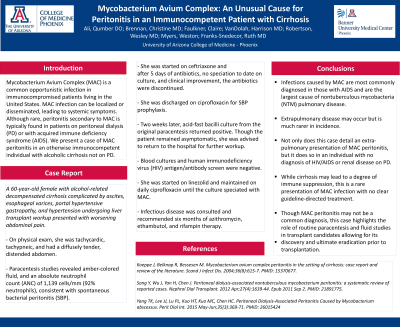Tuesday Poster Session
Category: Liver
P3930 - Mycobacterium Avium Complex: An Unusual Cause for Peritonitis in an Immunocompetent Patient With Cirrhosis
Tuesday, October 24, 2023
10:30 AM - 4:00 PM PT
Location: Exhibit Hall


Qumber Ali, BS, DO
University of Arizona College of Medicine
Phoenix, AZ
Presenting Author(s)
Qumber Ali, BS, DO, Christine Brennan, MD, Claire Faulkner, BA, Harrison VanDolah, MD, Wesley A.. Robertson, MD, MPH, MPA, Weston Myers, , Ruth Franks-Snedecor, MD
University of Arizona College of Medicine, Phoenix, AZ
Introduction: Mycobacterium Avium Complex (MAC) is a common opportunistic infection in immunocompromised patients living in the United States. MAC infection can be localized or disseminated, leading to systemic symptoms. Although rare, peritonitis secondary to MAC is typically found in patients on peritoneal dialysis (PD) or with acquired immune deficiency syndrome (AIDS). We present a case of MAC peritonitis in an otherwise immunocompetent individual with alcoholic cirrhosis not on PD.
Case Description/Methods: A 60-year-old female with alcohol-related decompensated cirrhosis complicated by ascites, esophageal varices, portal hypertensive gastropathy, and hypertension undergoing liver transplant workup presented with worsening abdominal pain. On physical exam, she was tachycardic, tachypneic, and had a diffusely tender, distended abdomen. Paracentesis studies revealed amber-colored fluid, and an absolute neutrophil count (ANC) of 1,139 cells/mm3 (92% neutrophils), consistent with spontaneous bacterial peritonitis (SBP). She was started on ceftriaxone and after 5 days of antibiotics, no speciation to date on culture, and clinical improvement, the antibiotics were discontinued. She was discharged on ciprofloxacin for SBP prophylaxis. Two weeks later, acid-fast bacilli culture from the original paracentesis returned positive. Though the patient remained asymptomatic, she was advised to return to the hospital for further workup. Blood cultures and human immunodeficiency virus (HIV) antigen/antibody screen were negative. She was started on linezolid and maintained on daily ciprofloxacin until the culture speciated with MAC. Infectious disease was consulted and recommended six months of azithromycin, ethambutol, and rifampin therapy.
Discussion: Infections caused by MAC are most commonly diagnosed in those with AIDS and are the largest cause of nontuberculous mycobacteria (NTM) pulmonary disease. Extrapulmonary disease may occur but is much rarer in incidence. Not only does this case detail an extra-pulmonary presentation of MAC peritonitis, but it does so in an individual with no diagnosis of HIV/AIDS or renal disease on PD. While cirrhosis may lead to a degree of immune suppression, this is a rare presentation of MAC infection with no clear guideline-directed treatment. Though MAC peritonitis may not be a common diagnosis, this case highlights the role of routine paracentesis and fluid studies in transplant candidates allowing for its discovery and ultimate eradication prior to transplantation.
Disclosures:
Qumber Ali, BS, DO, Christine Brennan, MD, Claire Faulkner, BA, Harrison VanDolah, MD, Wesley A.. Robertson, MD, MPH, MPA, Weston Myers, , Ruth Franks-Snedecor, MD. P3930 - Mycobacterium Avium Complex: An Unusual Cause for Peritonitis in an Immunocompetent Patient With Cirrhosis, ACG 2023 Annual Scientific Meeting Abstracts. Vancouver, BC, Canada: American College of Gastroenterology.
University of Arizona College of Medicine, Phoenix, AZ
Introduction: Mycobacterium Avium Complex (MAC) is a common opportunistic infection in immunocompromised patients living in the United States. MAC infection can be localized or disseminated, leading to systemic symptoms. Although rare, peritonitis secondary to MAC is typically found in patients on peritoneal dialysis (PD) or with acquired immune deficiency syndrome (AIDS). We present a case of MAC peritonitis in an otherwise immunocompetent individual with alcoholic cirrhosis not on PD.
Case Description/Methods: A 60-year-old female with alcohol-related decompensated cirrhosis complicated by ascites, esophageal varices, portal hypertensive gastropathy, and hypertension undergoing liver transplant workup presented with worsening abdominal pain. On physical exam, she was tachycardic, tachypneic, and had a diffusely tender, distended abdomen. Paracentesis studies revealed amber-colored fluid, and an absolute neutrophil count (ANC) of 1,139 cells/mm3 (92% neutrophils), consistent with spontaneous bacterial peritonitis (SBP). She was started on ceftriaxone and after 5 days of antibiotics, no speciation to date on culture, and clinical improvement, the antibiotics were discontinued. She was discharged on ciprofloxacin for SBP prophylaxis. Two weeks later, acid-fast bacilli culture from the original paracentesis returned positive. Though the patient remained asymptomatic, she was advised to return to the hospital for further workup. Blood cultures and human immunodeficiency virus (HIV) antigen/antibody screen were negative. She was started on linezolid and maintained on daily ciprofloxacin until the culture speciated with MAC. Infectious disease was consulted and recommended six months of azithromycin, ethambutol, and rifampin therapy.
Discussion: Infections caused by MAC are most commonly diagnosed in those with AIDS and are the largest cause of nontuberculous mycobacteria (NTM) pulmonary disease. Extrapulmonary disease may occur but is much rarer in incidence. Not only does this case detail an extra-pulmonary presentation of MAC peritonitis, but it does so in an individual with no diagnosis of HIV/AIDS or renal disease on PD. While cirrhosis may lead to a degree of immune suppression, this is a rare presentation of MAC infection with no clear guideline-directed treatment. Though MAC peritonitis may not be a common diagnosis, this case highlights the role of routine paracentesis and fluid studies in transplant candidates allowing for its discovery and ultimate eradication prior to transplantation.
Disclosures:
Qumber Ali indicated no relevant financial relationships.
Christine Brennan indicated no relevant financial relationships.
Claire Faulkner indicated no relevant financial relationships.
Harrison VanDolah indicated no relevant financial relationships.
Wesley Robertson indicated no relevant financial relationships.
Weston Myers indicated no relevant financial relationships.
Ruth Franks-Snedecor indicated no relevant financial relationships.
Qumber Ali, BS, DO, Christine Brennan, MD, Claire Faulkner, BA, Harrison VanDolah, MD, Wesley A.. Robertson, MD, MPH, MPA, Weston Myers, , Ruth Franks-Snedecor, MD. P3930 - Mycobacterium Avium Complex: An Unusual Cause for Peritonitis in an Immunocompetent Patient With Cirrhosis, ACG 2023 Annual Scientific Meeting Abstracts. Vancouver, BC, Canada: American College of Gastroenterology.
